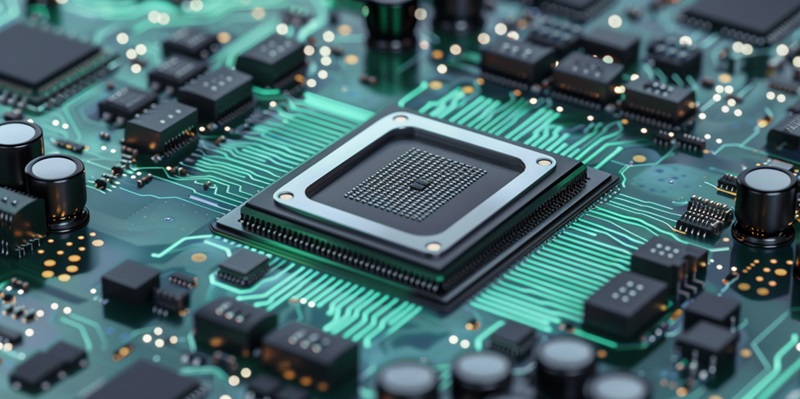The AMD Ryzen AI 9 HX 370 processor has recently emerged as a formidable contender in the high-performance computing landscape, drawing significant attention from tech enthusiasts and industry analysts. As part of AMD’s Zen 5 Strix Point lineup, this new processor showcases remarkable abilities across various performance metrics and benchmarks. It achieves notable scores in single-threaded and multi-threaded tests on PassMark, positioning it as a rival to Intel’s and Apple’s flagship processors. This article delves into the detailed benchmarks and analyses provided by Anil Ganti to understand how the Ryzen AI 9 HX 370 stacks up against its competitors.
Benchmark Performance Comparison
Single-threaded and Multi-threaded Performance
The Ryzen AI 9 HX 370 delivers impressive results in both single-threaded and multi-threaded benchmarks, solidifying its reputation as a high-performance processor. In PassMark’s single-threaded test, it scores an impressive 4,213 points, surpassing Intel’s Core i9-13900HX and Apple’s M2 Max. However, it falls short when compared to Intel’s more advanced Raptor Lake processors like the Core i9-14900HX and i9-13980HX, as well as Apple’s M3 series. The multi-threaded performance paints a somewhat different picture, scoring 37,699 points. While still competitive, it lags behind certain older-generation CPUs, including the Ryzen 9 7945HX and its X3D variant.
This discrepancy can be attributed to the architectural improvements found in newer CPUs, rather than an increase in core counts. The Zen 5 architecture brings several enhancements in efficiency and performance per watt, but it appears that architectural tweaks in Raptor Lake and Apple’s M-series allow them to maintain an edge, particularly in multi-threaded scenarios. Despite this, the Ryzen AI 9 HX 370 holds its own as a versatile processor capable of handling a wide range of computing tasks, from gaming to professional applications, without major compromises.
Geekbench and Cinebench R24 Results
Further reinforcing its strong performance, the Ryzen AI 9 HX 370 achieves competitive scores in other popular benchmarking tools like Geekbench and Cinebench R24. On Geekbench, the single-core and multi-core scores reflect its ability to handle intensive workloads effectively, making it an appealing option for users requiring a reliable and powerful processor. Cinebench R24 benchmarks also highlight the processor’s prowess in rendering tasks, underscoring its utility for creative professionals who depend on fast and efficient computational capabilities.
In addition to high single-threaded performance metrics, the Ryzen AI 9 HX 370 exhibits balanced outcomes across various computational workloads, as seen in PassMark’s additional performance tests. For example, it achieves 132,509 MOps/sec in integer math, 82,837 MOps/sec in floating-point math, and 24,257 MBytes/sec in data encryption. These figures suggest that the processor is well-rounded, suitable for both general-purpose computing and specialized tasks that demand high-performance processing power.
Market Implications and Future Prospects
Competitive Positioning Against Giants
The introduction of the Ryzen AI 9 HX 370 demonstrates AMD’s strategic intent to reclaim its market share against industry titans like Intel and Apple. Given the significant advancements illustrated in benchmarks, AMD appears poised to challenge the dominance of Intel’s Raptor Lake processors and Apple’s M-series. The anticipated launch of Strix Point laptops featuring this processor marks a critical milestone in AMD’s history of laptop processors, potentially influencing market dynamics in the high-end processor segment.
Despite its competitive edge, the Ryzen AI 9 HX 370’s performance in multi-threaded workloads indicates some room for improvement compared to certain Raptor Lake and Apple M-series processors. As AMD continues to innovate and refine its architecture, future iterations of the Zen 5 lineup or even newer Ryzen 8000 SKUs may close this gap. Additionally, the article highlights that the suboptimal performance of upcoming Hawk Point-based Ryzen 8000 processors is likely due to lower power limits, hinting at the potential for future enhancements as AMD addresses these limitations.
A Vision for AMD’s Future Processors
The AMD Ryzen AI 9 HX 370 processor has recently made waves in the high-performance computing world, garnering considerable attention from tech enthusiasts and industry analysts alike. As part of AMD’s Zen 5 Strix Point series, this groundbreaking processor displays exceptional capabilities across numerous performance metrics and benchmarks. It excels in both single-threaded and multi-threaded tests on PassMark, effectively positioning itself as a strong competitor to the flagship processors from Intel and Apple. This analysis aims to dive deep into the detailed benchmarks and insights provided by Anil Ganti to explore how the Ryzen AI 9 HX 370 competes against its industry counterparts. With its advanced architecture and impressive performance, the Ryzen AI 9 HX 370 not only promises to elevate AMD’s reputation in the tech community but also sets a new standard for what can be expected from high-performance processors. By examining Ganti’s comprehensive review, we aim to highlight the processor’s strengths and potential areas for improvement, ultimately providing a thorough understanding of its place in the market.

